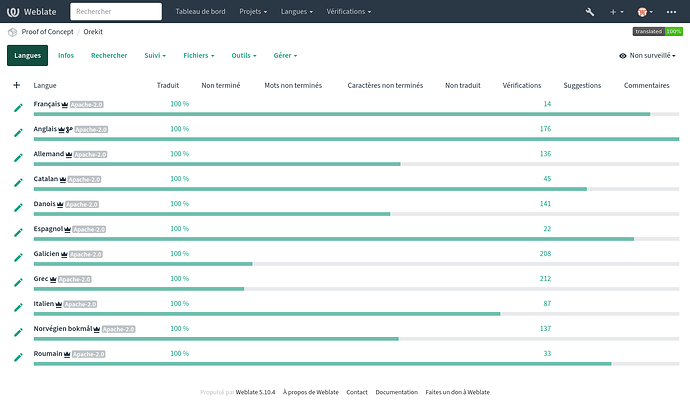Hi,
Short of setting up any of those platforms, which definitely look like much better solutions, I was playing a bit with setting up a way to automatically process the translation files.
I’ve got a working prototype, very dirty implementation at this point, but thought I’d share it here in case it is somehow useful. Basically, I aimed to perform the following.
First, we parse OrekitMessages.java (which, as far as I understand, would be the master file where developers would be placing new messages) to get the list of currently defined messages, with their keys and message string for each.
Then, we perform the following actions to generate/modify resource files at build time.
First, we create the corresponding resource file with the English messages. Since this file does not involve any translation (English messages are already defined in OrekitMessages.java), it seems it would never require any manual intervention. From what I see in the translation resource files, they follow the pattern of having 3 lines for each message:
- Line 1 is a hash character, followed by a single whitespace, followed by the unformatted error string.
- Line 2 is the error key - unformatted error string pair, separated by the = character
- Line 3 is empty, i.e., just a newline character.
So we can easily write this file, having the messages in the same order as found in OrekitMessages.java
Then, for each of the supported languages, we do the following:
- If there is not already available a corresponding resource file before performing these build-time modifications, then the corresponding resource file will simply be written as exactly the same as the english resource file, but for each error key, in line 2, after the = symbol, instead of writing the unformatted error string, we will just write
<MISSING TRANSLATION>
- However, if there is such a file already available, we parse it to obtain the available translated strings for each present error message. From this step, we will get some error keys for which a translation was available, and some others for which it wasnt. The latter will be those that had the value
<MISSING TRANSLATION> after the = symbol. We then write a new resource file such that it contains the exact same set of errors as the English resource file, but for keys that had a translation available, we write this translation as the unformatted message string after the = symbol. For keys that either were not present in the already available translation resource file, or were present but had a value of <MISSING TRANSLATION>, we write <MISSING TRANSLATION> as their value in the newly written translation resource file. This has also the advantage that all translation files will contain all the errors in the same order, which will match the order in OrekitMessages.java.
Having this, we then also need to fix the fact that in OrekitMessagesTest.java, we have a test for the number of messages, with the expected number hardcoded (currently at 315). I’ve tried to handle this by also writing at build time a properties file with the number of messages obtained from parsing OrekitMessages.java, and then OrekitMessagesTest.java reads the expected value from this properties file.
All of the manipulations are handled from a new class, TranslationTemplateGenerator.java, which is called at build time by the exec-maven-plugin. So I had to modify accordingly pom.xml
With this setup, there is no modification required to any of the tests (except the one for the number of messages).
I still have quite a bit of checkstyle work and making code nicer, but since I got a first draft passing tests, I thought I’d share it here. I’ve put it in this draft merge request
I hope it can be somehow useful! At the very least, it was a very fun learning experience
![]()
